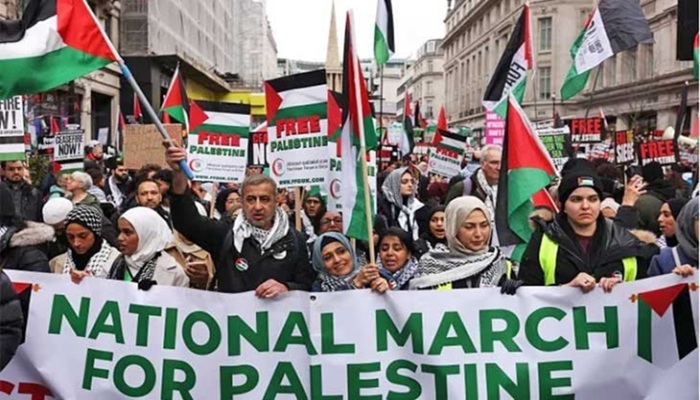
Afrasianet - Nada Hoteit - In this scene, we can only note the ambiguity in the response to the ongoing genocide of the Palestinians between the two wings of the Old Continent:
in the capitals of Western Europe, streets filled with pro-Gaza banners, crowds demanding an end to the killing, starvation and targeting of journalists, and young faces igniting squares London, Berlin, and Paris, with a sweeping moral sense that makes them stubborn, do not fear the power of the security services that invade in defense of the entity, nor the politicized judicial rulings, while Warsaw, Budapest, Bucharest and the rest of the capitals of Eastern Europe seem at the same time to be in political hibernation towards the ongoing genocide, without a public pulse that is close to what we are witnessing on the other side of the continent, and no government embarrassment that pushes to take unprecedented diplomatic positions in its audacity to criticize the Israeli war, which leads one to wonder about the backgrounds of this scandalous disparity Between peoples united by the space of the European Union.
Western Continent: Humanitarian Sympathy and Political Clash
In Germany, Britain, France, and a number of Western and Nordic countries, news bulletins over the months have provided daily images of Gaza: devastated neighborhoods, mothers screaming in the rubble, hospitals without medicine or electricity, hungry people risking their lives for a bag of flour.
This torrent of sight has awakened an uncorrupted moral compass among a large segment of the public, and the Palestinian file has become an issue of conscience and human rights, before it became a distant geopolitical conflict there in the Middle East A civic collective summarizing citizens' pains and grievances in the face of the authorities about the meaning of political representation, the boundaries of alliances between classes and ethnicities, and the place of human rights in foreign policy.
The East: The Near War Before the Distant War
In Eastern Europe, security priorities continue to be overshadowed by the Ukraine war.
There, where the near enemy is clear, the allegations of the Russian threat are present in every news bulletin, energy prices and secure borders remain more important than any other file. In this context, citizens of the eastern continent often read the Gaza war from the perspective of international alignments:
Israel sees Israel as a tacit partner of the West in confronting the opposing axis, and any rhetoric that criticizes it passes through the filters of security and alliances. The local media is busy with extensive coverage of the battlefields in Kharkiv or Odesa, not the annihilation of Gaza.
The Power of Civil Society
Apart from this difference in local priorities, it is also noted that the civil society network in Western Europe is strong and influential compared to the Eastern Europe, where unions, student unions, human rights organizations, and municipalities have a long history of supporting solidarity campaigns with the people.
These networks have experience translating anger into political pressure on the nerves of governments: from marches, to petitions, from boycott campaigns, to parliamentary debates. Even when protests are organized, they are often local in nature (prices, corruption, environmental issues) and not related to foreign policy, so they do not gain the momentum or symbolism they see in the London or Berlin marches where Palestine is raised as a broader symbol of justice and rights.
In France, Germany, and Britain, millions of Arabs and Muslims are an important part of the social fabric and have a significant presence in universities, unions, and municipal councils.
These social and religious ties with the Palestinians mean that the tragedy of Gaza is not a distant story, but rather the story of a friend, a classmate, a relative or a brother in religion.
In the East, the picture is different, with Muslim communities less numerous and influential, and historical memory carrying layers of tension with the "Muslim Other" linked to past conflicts with the Ottoman Empire or the southern neighborhood. This, of course, does not negate the existence of human sympathy for the victims of the genocidal war, but it passes through cultural and political filters that reduce its potential to turn into a broad mass action.
The media in the west of the continent, despite its biases, provides wider spaces for human rights and legal debate, and hosts some voices against government policies, especially from MPs, jurists, and doctors. In the east, the dominant framework is "security" and "alignments", with a large presence of state officials and a lack of human rights or critical voices.
The result is that viewers in the West hear the news of Gaza coupled with international law and human rights, while the Eastern listeners hear it coupled with the fight against terrorism and regional stability. But in the east, the few protests are briefly displayed or linked to security concerns, limiting their ability to inspire others to come out.
In the West, there are bolder governments (Ireland, Spain) and more adherent to the alliance with Israel (Britain, Germany). In the east, there are sympathetic but muted or non-institutionalized popular positions, accompanied by slow shifts in official tone as the humanitarian cost of war escalates. But if the Gaza war is accompanied by other crises directly internal—such as energy crises, migration, or even declining Western support for Ukraine—a window could open for a new intersection between humanitarian sympathy and political expediency. Until then, however, the newscasts will continue to tell two parallel stories that do not meet: angry Westerners whose streets are buzzing with cries for freedom for Palestine, and an East where the groans of Gaza's victims are lost under the noise of war next door.

